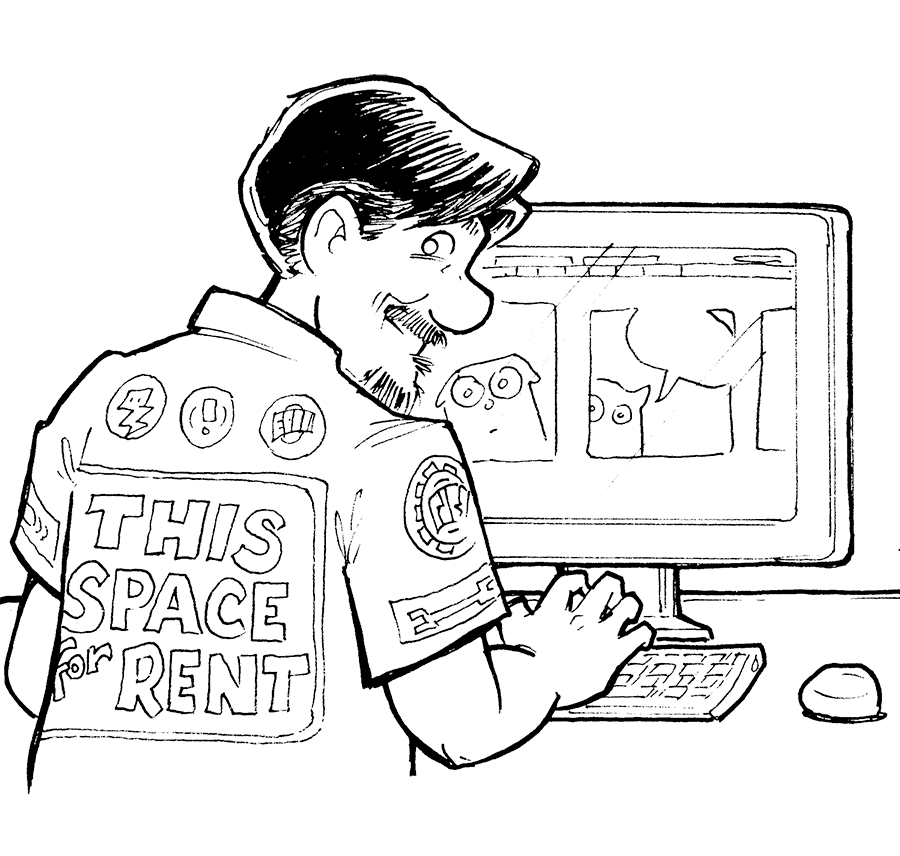May was an excellent example of the tremendous value offered by a subscription to Webcomics.com. My readers got early alerts on issues that would impact their businesses, helpful tutorials, insightful analysis, and meaningful feedback on their work. Here are some samples of what you may have missed…
How to Easily Grow Your Patreon Followers by 30% or More in a Month
This post has been submitted by Webcomics.com member Tyler James, of ComixLaunch. I strongly recommend his post on keeping a 30-Day Patreon Launch Journal.
“Patreon is not a tip jar. It’s a subscription service for exclusive content.”
That was one of several big takeaways from my recent ComixLaunch interview on the state of the webcomics business model with Brad Guigar.
During our conversation, Brad talked frankly about how figuring out Patreon and more importantly figuring out what his patrons actually wanted from him, was a key to keeping his business sustainable in the face of changing market forces.
Like many of you, I love hearing great ideas.
I love the explosion of possibilities gaining new knowledge sets off in my mind.
But I also know that knowledge alone is not power.
In this information age, ideas are selling for far less than a dime a dozen.
And good ideas have an expiration date. [Subscribers can read the rest of this post]
Longform Comics Publishing Strategy — Non-humor
We’ve had an excellent discussion in the Private Forum about traffic-building on the post-ad-blocker web.
In the course of the conversation, I started brainstorming on a special publishing strategy for longform comics that can’t/don’t use humor as a hook for their updates.
I think it’s worth experimentation.
And it’s all about cultivating the orbital reader
[This was a FREE FRIDAY post, you can read the whole thing without a subscription!]
Webcomics Confidential Ep 12 — People Want Stuff for Their Money
It’s why you’re underachieving on Patreon. You think it’s about you and your dreams. You think it’s a tip jar. You think it’s about your personal journey. It’s not about any of that stuff. It’s all about the reader, and they want to know “what’s in it for me?” If you can’t answer that — satisfactorily — then you lose. People want stuff for their money. It’s that simple. But until you understand it — and apply it – you’re going nowhere fast.
[Subscribers can view the entire video here]
Webcomics Confidential Ep 13 — Prepping Images for Print
Today’s Webcomics Confidential is a step-by-step tutorial on preparing images to be printed in CMYK/offset setting. We’ll talk about setting up a properly working “lineart” layer, setting a trap layer for a rich black, and more!
[Subscribers can view the entire video here]
Jetpack Premium is free for DreamPress users
I strongly endorse using the Jetpack plug-in for WordPress sites. I’m also a big fan of DreamHost, and I use them for my sites. Here’s good news for members who use both… [Subscribers only]
Webcomics Confidential Ep 14 — Do. A. Good. Comic.
My Twitter feed exploded last night when someone asked for the top three ways to bring traffic to a webcomic. My answer was simple:

That was NOT what people wanted to hear. But I believe it passionately… and since Twitter is a horrible way to communicate, I decided to elaborate on my thoughts on the next Webcomics Confidential.
[Subscribers can watch the entire video here]
Webcomics Confidential Ep 15 — The Death of Ads
Around 2014, webcomics reached the tipping point with ad blockers. With ad revenue restricted to a trickle, many of the traditional, assumed features of webcomics have lost their original purpose. Daily updates…publishing the most recent update on the home page… free archives… all of these things were created to service an ad-supported business model. Removing ads, then, makes it necessary to rethink webcomics from the ground up.
[Subscribers can watch the entire video here]
Pro Tip — Setting up a Book Cover in InDesign Quickly
Designing a book cover entails creating the back cover, spine and front over all on the same document. And that can be a little tricky. Heres a little tip to get you moving fast. [Subscribers can read the entire tutorial here.]
How to Set Up a Spot UV Gloss in InDesign
A spot-UV gloss effect can really add some pizazz to your book cover.

But it’s a little tricky to set up. Here’s a step-by-step tutorial. [Subscribers can read the entire tutorial here]
Webcomics Confidential Ep 16 — Reader-retention analytics
A Webcomics.com member challenged my thinking (in a good way) on reader retention in the “Do A Good Comic” episode of Webcomics Confidential. He suggested a mathematical formula to help track his success at retaining readers. It was a concept that rattled around in my brain for several days afterwards. After all, it seems logical that — if what I was saying was true, it should be able to be measured. But, I’m not convinced that it can. And I’ll try to explain why that it…
[Subscribers can watch the entire video here]
 A new “talent search” … a new warning
A new “talent search” … a new warning
You’ve heard me say it before… always read your contract, and pay careful to the fine print. I’ve been traditionally wary of talent searches and talent contests going all the way back to Zuda (and beyond). There’s a new talent search being promoted for an upcoming comic convention, but in this case, it’s important to pay attention to a little bit more than the fine print… [Subscribers can read the entire post here]
 Tapastic Adds “Right of First Refusal”
Tapastic Adds “Right of First Refusal”
Bleeding Cool is reporting that webcomic host/publisher Tapastic has added a “right of first refusal” clause to their Terms of Service:
If user desires to sell, license, exercise or otherwise dispose of, indirectly or directly, any rights or any interest in any content posted on the Platform (the “Offered Right”), then the user shall give written notice to Tapas Media of such desire. Commencing upon Tapas Media’s receipt of such notice there shall be a 30 day period in which user will negotiate in good faith with Tapas Media for Tapas Media’s acquisition of such offered rights. If by the end of 30 days no agreement has been reached or if at anytime Tapas Media declines interests in the offered rights, then the user shall be free to negotiate elsewhere with respect to such offered Right.
I suggest you take a close look at Tapastic’s updated languages and make your own decisions soon.
I deleted my Tapastic account because they granted themselves right of first refusal in their updated Terms of Service agreement (TOS). After I deleted my account with them, Bleeding Cool reported a response from the company to the angry backlash over the rights-grab. My deleted account is staying deleted, and I’ll tell you why… [Subscribers can read the entire post]
 Twelve Ways You’re Doing Patreon Wrong
Twelve Ways You’re Doing Patreon Wrong
Some cartoonists have been asking me to give them my thoughts on their Patreon pages. And I’ve opened up a new Hot Seat critique series based on members’ Patreons. And — honestly, I’m a little obsessed — when I see a new Patreon page being promoted, I go over and see how they’ve got it structured. Sometimes, I find ideas worth stealing. But more often, I’m seeing a lot of the same mistakes being made over and over again. And, in my opinion, it’s having an adverse effect on your ability to generate support.
Now, this is usually where I cut the article and throw the rest of the post behind the paywall. But this one is so damned important, I’m not going to do that. If this is you, you need to stop, rethink and rebuild.
[This was a FREE FRIDAY post, you can read the whole thing without a subscription!]
Webcomics Confidential Ep 17 — Social-Media Tips
It’s Q&A time on today’s Webcomics Confidential! A Webcomics.com member writes:
I was hoping you could talk a little social media strategy sometime. I was terrible for being that “go check out my comic” person but I get completely stumped as to what else to post. I can’t imagine anyone cares what I had for lunch as those kinds of things always make me tune-out and I’m never sure when a simple opinion like, “Tupperware is useful sometimes” is going to set off a rage response about someone’s Tupperware trauma. Do you have any go-to tricks for posting ideas? Questions you might ask yourself or techniques like the word-association thing you’ve discussed for breaking writer’s block?
So… when it comes to media, what do you say when you have nothing to say? — Plenty! That’s when you drop back to the Three Cs of social media. And then, let’s talk about the Mirror Research that brought you to the (mistaken) conclusion that “Tupperware” posts are bad!
And then, near the end of the video, we tackle a burning question for all cartoonists. And the answer just might explain why we cartoonists have such a hard time getting paid for our work!
[Subscribers can watch the entire video here]
Webcomics Confidential Ep 18 — Launching a Book… Common Mistakes
A Webcomics.com member wrote in asking me to talk about common mistakes webcartoonists make when they’re preparing to do their first book. I started thinking about it, and there are a lot of them! I know because I made almost each one!
[Subscribers can watch the entire video here]
What Happened to the Harveys?

It just struck me in the shower this morning… the nominations for the Harvey Awards haven’t been announced. A quick check of my previous posts shows me that nominations had usually opened in late February or early March. Then, when I went to HarveyAwards.org, I was re-directed to Pheidias Project Management.
So what gives? [Subscribers can rad the entire post — including the “response” from Reed Expo]
Webcomics Confidential 19 — Time Management
Productivity apps, daily planners, Post-it™ notes… they’re all swell, but there’s a secret to mastering time management, and it’s important to understand it before you plunk your money down on any of that stuff.
[Subscribers can watch the entire video here]
Webcomics Confidential (Ep 20) — Webcomics Collectives
A Webcomics.com member wrote:
I’ve been reading webcomics since the early 2000s, and many of the webcomics that I read over the years were members of webcomics communities – Keenspot/Keenspace, Blank Label, Halfpixel, and a few others. I always thought that being a part of a community like that would be beneficial because of strength in numbers, cross promotion, and having people to lean on when you need help. Do you think that webcomic communities are a thing of the past or could they still be a good thing (or is it a case-by-case kind of situation)? It would seem to me that in an era of social connectivity that maybe it’s unnecessary.
It’s a great question. We’re certainly in an era in webcomics in which “everything old is new again.” Does that hold true for the Collectives of old? Perhaps. But here’s a few things you’ll want to keep in mind before signing up.
[Subscribers can watch the entire video here]
































